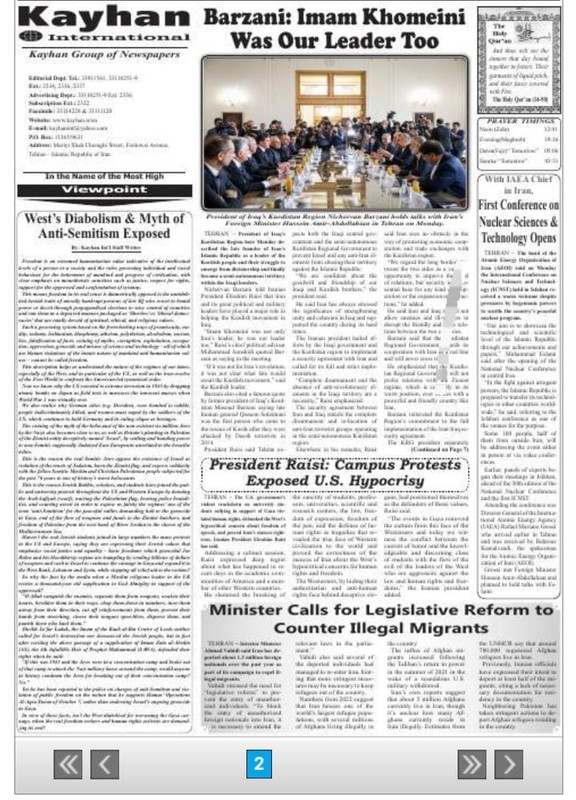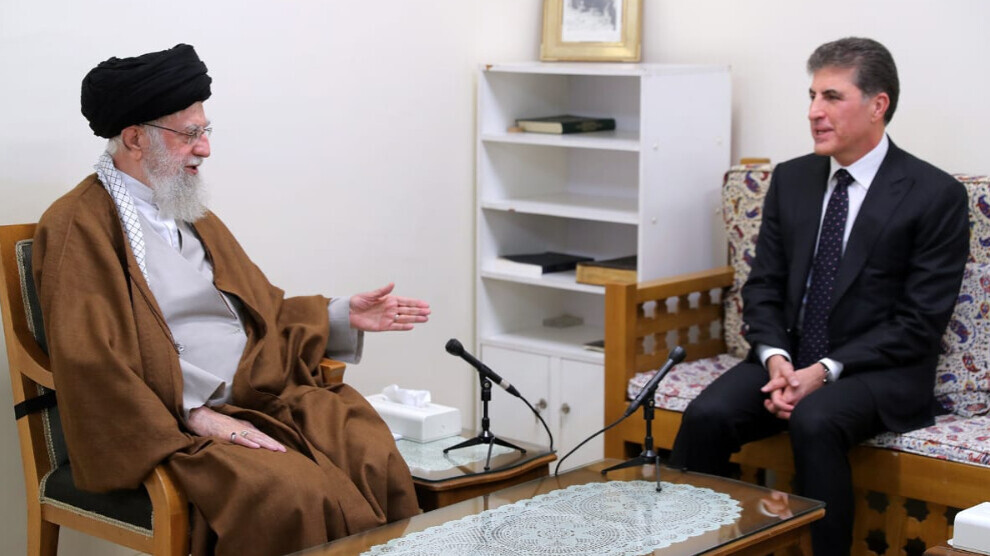The ruling party in the Kurdistan Region of Iraq, the KDP, left no stone unturned to postpone the parliamentary elections in Southern Kurdistan, and held some talks in Iran this time as a result of these attempts. Nechirvan Barzani travelled to Tehran and his first stop was Iranian religious leader, Ali Khamenei. Barzani then met with Iranian President Ebrahim Raisi with the accompanying delegation and met with many people at the state level respectively.
NEW DECISION BY IRAQI COURT AS NEGOTIATIONS CONTINUED IN TEHRAN
While the reflections of the meeting on the region are expected to continue in the coming days, some developments took place in Baghdad even before the negotiation table was lifted in Tehran. While Barzani posed for the cameras with the General Commander of the Iranian Revolutionary Guards Army, Hussein Salami, the Iraqi Supreme Federal Court, which had previously taken opposing decisions against the KDP, made a new decision. The court, under the influence of Iran, took the objection application submitted by Masrour Barzani on the grounds that the distribution of the seats to the regions was not legal, into its agenda with jet speed. According to the decision, the suspension of the implementation of the judgment will continue until the objection application is finalised.
HOW WILL THE SEAT DISTRIBUTION RATIO BE?
Within the scope of the decisions taken months ago, the Iraqi Supreme Federal Court decided that the Kurdistan region parliamentary elections, which were previously held under the name of one region, would be divided into 4 regions in the next election. These were determined as Sulaymaniyah, Hewlêr (Erbil), Duhok and Halabja. Accordingly, the 4-region election system consisted of 100 seats. The seat distribution ratio was determined as 34 for Hewlêr, 38 for Sulaymaniyah, 25 for Duhok and 3 for Halabja.
The same court also cancelled the KDP's minority quota of 11 seats. In this way, while the KDP would guarantee 11 seats even before the elections, the court decided to abolish this situation on the grounds that it was "unconstitutional". The new decision opens the doors for change on this issue as well.
SIGNAL OF POSTPONEMENT OR PREPARATION?
On the other hand, if the new application is not finalised until July, the Iraqi Supreme Election Commission's duty to conduct the elections will end. While this course of developments signals the postponement of the elections, it also strengthens the interpretation that the KDP is preparing to enter the elections by securing itself in return for some concessions.
TALABANI IN THE USA: WE DO NOT ACCEPT
The Patriotic Union of Kurdistan (PUK) Chairman, Bafil Talabani, who met with US officials in Washington at the same time, reiterated that the elections should be held on time. Talabani's party PUK made counter statements saying that both Masrour Barzani's application and the court's decision were illegal. While the Iraqi election law states that objection applications can be made 6 months before the elections, such an action one month before the elections does not comply with the constitution.
WHAT THE KAYHAN NEWSPAPER SAYS
While these were the first reflections of the talks in Tehran on Iraq, Barzani's Tehran traffic was glorified by some media organisations affiliated to KDP. As the Iranian media praised the talks, the Kayhan Newspaper, affiliated to Iran's religious leader Ali Khamenei, shared some data about the talks apart from the news reflected.
The newspaper used Barzani's remark "Imam Khomeini was our leader too" as the headline, and in the rest of the article, Barzani's words “If it was not for Iran’s revolution, it was not clear what fate would await the Kurdish movement,” were emphasised. These words and the way the news report is structured are reminiscent of the interview Mele Mistefa Barzani gave to the same newspaper in 1975, when he went to Iran after Aşbetal [Aşbetal means "stopping of the mill" among the people, while its political meaning, “Liquidation” was the withdrawal of the Kurds from the mountains with Mele Mistefa Barzani's declaration that "the revolution is over"]. While the only thing that has changed in the Barzanis is the grandfather-grandson, Kayhan Newspaper has changed hands from Shah Reza Pahlavi family to Ali Khamenei.
WHAT ROLE DID TEHRAN ASSIGN TO THE KDP?
While Tehran has been seriously disturbed by Israel's nesting in Hewlêr in recent years, it has brought this issue to the talks as part of the siege and attack plans developed against it. In connection with this, it also sees the plans developed by the KDP with the US and the Turkish state as an external threat. Trying to balance the KDP as a buffer against the Washington, Tel Aviv and Ankara bloc in the ever-rising tension, Tehran intimidates the Barzanis, but also tries to keep them alive in a partial way to frustrate what is being done against them. In this context, Tehran pushed Baghdad to take a few steps and pressed the button to improve relations with Hewlêr.
NEW PHASE WITH IRAN: NEW FOREIGN INTERVENTION
While Barzani's remark "We have entered a new stage in our relations with Iran" after his return to Hewlêr is of interest to many parties, it is also stated that Barzani, who worked for 2 months to make this meeting possible, accepted all the demands of Iran. While the possibility of the realisation of these developments on the ground brings along many interpretations, it is a matter of curiosity how Israel's reflex against this will resonate, most of all on the US front. The pursuit of the KDP, which plays the role of an apparatus in the conflicts between international and regional powers to save its own power in these conflicts, has brought the territory of Southern Kurdistan one step closer to new foreign interventions.
ROJHILAT PARTIES' TEST WITH XÊRXWAZIYA BARZANI
The existence of Rojhilat (Eastern Kurdistan, Iran) parties in Bashûr (Southern) Kurdistan is another issue that disturbs Iran. While the fate of these forces will be directly linked to the recent talks in Tehran, the KDP had assumed some roles in the "disarmament" of these parties as a result of the previous talks. However, the KDP acted otherwise and attempted to organise the parties in the region against Iran in a way to serve its own plans. In this context, the KDP has repositioned most of the aforementioned parties under the umbrella of the ‘Xêrxwaziya Barzani’ formation and is trying to keep these forces as political and military trump cards.















